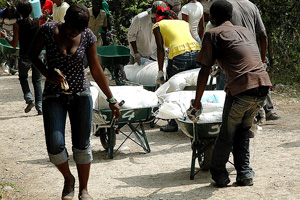
Caritas cash for work beneficiaries offloading a food truck at a distribution in Pétionville Club, Port-au-Prince.
Credits: CARITAS/Mathilde Magnier
Many Haitians have been left jobless after the dramatic quake that struck Port-au-Prince on January 12, claiming the lives of over 225,000 people. Two months after the event, employment is one of the most pressing issues in Haiti. Cash-for-work programmes remain the most significant sources of income in a country where up to 70 percent of the population was unemployed before the quake. Since January, Caritas is supporting the temporary employment of scores of Haitians.
“I need money! My family needs money! I am a trained nurse and paradoxical as it may seem in a country where so many people need medical assistance, it’s impossible for me to find a job,” explains Belonise Edouard, 37.
“I have sent dozens of CVs but never got any answer. Cash-for-work is my only option right now. I have children to feed!” adds the mother of three. Belonise was enrolled in Caritas cash-for-work programmes on January 31 and is currently helping with the food distribution at Pétionville camp, checking beneficiaries’ vouchers and making sure that no one cheats or gets served twice.
Jean-Pierre Bouves is in a similar situation. “I am an experienced lawyer, I have years of practice and yet I can’t find a job! The quake destroyed my house and all my belongings” says the 45-year-old, who is currently in charge of the cash-for-work security team for food distribution at Pétionville Club.
“Cash-for-work is the only alternative I have for the time being. I don’t make much money, less than 200 Gourdes per day (less than US$5), but it is always better than nothing. And most importantly, it keeps me busy,” Jean-Pierre explains, looking at a small green tent nearby where people are waiting for the day to go by. “In addition to our salary, we often get a little bit of food at the end of day,” adds Marlon Seriphia, 22, who is unloading the distribution trucks at Pétionville Club.
Since January, Caritas has kick-started cash-for-work activities that include building temporary facilities in sites such as Saint François de Sales Hospital, assisting with distributions, loading and unloading trucks at the different Caritas warehouses. Haitians are also clearing and preparing transitional shelter sites for safe re-settlement, repairing surface water draining or digging latrines in the spontaneous settlements. Each worker is paid 180 gourdes per day, or about US$4.50. People are only hired in the programme for a two-week period, so that more people can participate and benefit from it.
However, for Duncan, the cash-for-work programme is “not only money”. “I am glad I joined the project and built the latrines here! I am proud I contributed to the improvement of the camp’s living conditions,” explains the 19-year-old student who arrived at Acra Camp a couple of weeks after the earthquake. Together with his friend David, he spent two weeks building up latrines with Caritas’ water and sanitation team in the spontaneous settlement and “is happy people can have these services”.
As of the beginning of March, more than 70,000 Haitians were employed under this programme, and UNDP has set the goal of reaching more than 400,000 people by December 2010, indirectly benefiting two million Haitians. Caritas is scaling up its cash-for-work activities in the coming weeks.
“Cash-for-work is helping but it cannot be a long term solution. We all need to find proper jobs soon,” concludes Kellita.
